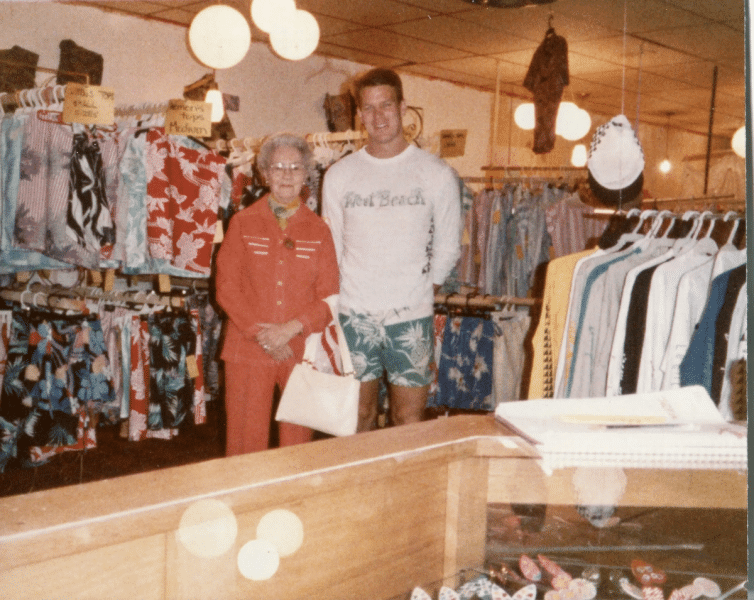Chip Wilson, an American-born Canadian businessman, is a pioneer in athleisure, having founded Lululemon Athletica in 1997. He had no idea he would change athletic wear forever. As of 2024, Chip Wilson’s estimated net worth is $6.5 billion, largely due to his ownership in Lululemon Athletica, which includes shares and profits from sales.
Here, we get into his career and net worth, exploring his life story to see what insights we can learn from Wilson – whose views on Lululemon Athletica’s inclusion efforts have been quite controversial.
Chip Wilson Net Worth Breakdown:
We have a clear understanding of Chip Wilson’s net worth since most of it is in publicly traded companies. Additionally, we’ve gathered a lot of public information about his different income sources, investments, assets, and business activities to create a comprehensive estimate, which we explain here for you.
| Asset or Income Source | Contribution to Net Worth |
| Lululemon Athletica stake | $2.7 billion |
| Amer Sports stake | $950 million |
| Anta Sports stake | $150 million |
| Real estate | $500 million |
| Other business investments | $1.5 billion |
| Total Net Worth | $6.5 billion |
Chip Wilson’s Early Life
Chip Wilson was born Dennis J. Wilson in Los Angeles, California, on April 25, 1955. Both his parents were athletes at college and his father went on to become a physical education trainer. The family moved to Canada when Wilson was five and his parents divorced seven years later.
Wilson had an interest in sports since his childhood and he was a competitive swimmer while growing up. Wilson attended the University of Calgary, graduating with a bachelor’s degree in economics in 1979, and worked as an economist for a while after. He played football while at college and completed an Ironman triathlon at the age of 28.

Chip Wilson’s Personal Life
Lululemon Founder Chip Wilson married Summer Wilson in 2002. He had two sons from a previous marriage and the couple welcomed three more sons to the family. Chip Wilson and Summer Wilson stay at their home in Vancouver.
Chip Wilson’s Net Worth: Snowboards to Infamous Yoga Pants
Chip Wilson’s journey to founding his iconic yoga apparel brand started with his initial struggle to sell his designs. Here’s how he made the leap towards one of the biggest athlesiure brands in the world.
Westbeach Snowboard
Chip Wilson founded Westbeach Snowboard Ltd in 1979. The company was the first of many retail companies Wilson would be associated with. It sold apparel targeted at the surf, snowboard, and skate markets.
On his website, Wilson says, “The mistake that led to my success was an inability to sell my long, baggy, wild patterned shorts to wholesalers. Consequently, I was forced to open my own store.” He continued:
Because I owned my manufacturing and my stores, I took triple the profit and created vertical retailing
In the early 1990s, he gave up the position of CEO at Snowboard to focus on products. The company remained unprofitable, and in 1997, Wilson sold the company for $15 million. He thought of becoming a barista after selling the company, saying “I could avoid years of uncertainty, stress, hard work, mounting responsibilities, and fiscal pressure.”
Creating Lululemon Athletica
Instead, in 1997, Wilson created Lululemon after he got the idea after watching his gym instructor wearing apparel from a dance apparel company. While yoga and athletics were growing in popularity among women, no companies were making products specifically for them.

According to Wilson, he “… believed that if I could solve the transparency problem, address camel-toe, and thicken the fabric to mask any imperfections, I could create a perfect athletic garment for women.”
He targeted a very specific demography that he named Super Girls and termed them “the best of the best”. In his book, while talking more about this demographic, he said that a 22-year-old college graduate thinks “utopia was to be a fit, 32-year-old with an amazing career and spectacular health. She was traveling for business and pleasure, owned her own condo, and had a cat. She was fashionable and could afford quality.”
The story of why he picked up the name Lululemon has controversial roots; according to Wilson, he did so to attract a Japanese audience. “Brand names with Ls in them sounded even more authentically North American/Western to Japanese consumers, especially the 22-year-olds,” said Wilson in his book.
In a 2004 interview with Canada’s National Post Business Magazine, he had said, “The reason the Japanese liked [my former skateboard brand, Homeless] was that it had an L in it and a Japanese marketing firm wouldn’t come up with a brand name with an L in it. L is not in their vocabulary. It’s a tough pronunciation for them. So I thought, next time I have a company, I’ll make a name with three Ls and see if I can get three times the money.”
View this post on Instagram
Resigning From Lululemon
In 2005, Wilson quit as Lululmeon’s CEO while retaining his position as the chairman. In 2012, he also resigned from the position of chief innovation and branding officer and the next year he also resigned as the chairman.
His exit from Lululemon was not free from controversies and there was a lot of friction between him and CEO Christine Day. In his book Little Black Stretchy Pants Wilson called Day a terrible CEO and questioned her vision for the company during a 2013 meeting.
Notably, 2013 was a particularly problematic year for Lululemon and the company had to recall its signature black yoga pants as they were unintentionally see-through. Obviously, this would be a colossal problem for pants of any kind and the entire Lululemon brand was centered around this problematic product line. Lululemon stock unsurprisingly fell after the company’s yoga pants were recalled.
Meanwhile, the same year, Wilson created a lot of controversy over his comments about women, and in an interview, he defended Lululemon pants, saying “Frankly some women’s bodies just don’t actually work for it.” He added, “They don’t work for some women’s bodies… it’s really about the rubbing through the thighs, how much pressure is there over a period of time, how much they use it.”

While he later apologized for his comments the damage to his reputation was already done. On his website, Wilson said he quit Lululemon because he was “At odds with a board of directors who did not want to invest in the future, I departed in 2013.”
In 2015, Wilson also resigned from Lululemon’s board, and in an interview with Forbes he said, “I have achieved the goals I set when I came back, and after careful thought, I believe that now is the right time to step away from the board.”
What Is Chip Wilson Doing Now?
Wilson has sold most of his Lululemon stock to private equity firm Advent Capital but still has an 8% stake in the sportswear company, according to regulatory filings. As of July 2024, the company is valued at $34.89 billion, putting his stake at $2.7 billion. If he had held on to his 29% stake that he had in 2013, his Lululemon stake alone would be worth $10.11 billion.
After leaving Lululemon Athletica he was associated with Kit and Ace. The “‘technical cashmere” brand was launched in 2014 and was initially led by his wife Shannon Wilson and son J.J. Wilson, but Chip Wilson was also involved with the company.
In 2018, the family sold the brand to Lululemon executive George Tsogas. However, the business was struggling and now has just about half a dozen locations which is a tenth of what it was at its peak in 2016.
Wilson has been trying his hand at other businesses and formed a holding company named Hold It All Inc. which holds the business interest of the Wilson family. Wilson has five lines of businesses which include real estate, philanthropy, private equity, passive investments – and of course apparel.
Chip Wilson Net Worth: Investments & Philanthropy
Chip Wilson holds stakes in several companies through his Anamered Investments. These include a nearly 16% stake in Amer Sports which is valued at around $950 million. In 2019, he invested $100 million for a 0.6% stake in Chinese sportswear maker Anta Sports Products.
Chip Wilson’s Philanthropy
Wilson was diagnosed with facioscapulohumeral muscular dystrophy (FSHD) over 3 decades ago, but he only publicly disclosed it in 2022. In March that year, Wilson pledged $75 million to a new organization he set up to eradicate FSHD by 2027 and according to the company’s website, it has already received funds worth over $30 million.
The venture is close to Wilson’s heart – who says he might need a wheelchair in a few years due to his condition. According to Wilson, “I prefer not to sit in the stands, but to be on the court to solve this disease that is so very close to my heart.”
In addition, his Wilson 5 Foundation supports land conservancy, parks, and public art in British Columbia. The foundation has committed $100 million to preserve and protect British Columbia’s natural spaces.
In 2007, Chip Wilson and Summer Wilson founded Imagine1day to work towards the goal of ensuring that by 2030, all children in Ethiopia get access to quality education without any foreign aid.
The family has also donated $8 million to find the Chip and Shannon Wilson School of Design at Kwantlen Polytechnic University in Vancouver. The facility opened in 2018 and aims to nurture young talent in the fashion industry
An incredible morning. Very proud to commemorate the opening of @WilsonDesignKPU. @KPUmedia pic.twitter.com/uMVhmE9PpO
— Chip Wilson (@ChipYVR) January 3, 2018
Chip Wilson’s Impressive Real Estate Portfolio
According to a 2020 report by the independent property assessment agency British Columbia Assessment Authority, Wilson has a residential property in Vancouver valued at around $50 million.
He has a sprawling real estate portfolio and holds several properties apart from the Vancouver estate. Along with his real estate executive friend David Ferguson, Wilson set up Low Tide Properties in 2010, and the company started buying commercial real estate in Vancouver. The Vancouver-based company has also invested in Seattle and is scouting for a third city to invest.
At one point, Wilson planned to have 65% of his net worth in real estate by 2030 but that goal looks out of reach. Speaking with Canadian Real Estate Investor podcast in 2023, Wilson said, “Our other businesses have done so well that, you know, we haven’t reached that percentage… We’ll probably be lucky to get to 20 [percent]. And that’s buying almost as fast as we can.”
A conservative value of Wilson’s real estate investments – which include his personal holdings, as well as well as those listed on Low Tide’s website, some of which are jointly owned – would be $500 million.
Chip Wilson’s Controversies
Chilp Wilson has been at the center of controversy on more than one occasion, especially about his views on diversity. He has lashed out at the “whole diversity and inclusion thing” at Lululemon and in 2024, described those appearing in ads for its athletic wear as “unhealthy”, “sickly”, and “not inspirational”.
His views on child labor are also controversial. Wilson told the delegates of the BALLE BC conference that “third-world children should be allowed to work in factories because it provides much-needed wages.”
Speaking with The Tyee he added, “I look at it the same way the WTO does it, and that is that the single easiest way to spread wealth around the world is to have poor countries pull themselves out of poverty.”
What Can We Learn from Chip Wilson’s Life?
While Wilson’s views on inclusion and diversity are controversial, there are several life lessons to be drawn from his success, especially for budding entrepreneurs.
He created a strong brand and Lululemon pants became and remain a global hit. His focus on the consumer helped aid the company’s success. Also, Wilson was able to spot the opportunity for athleisure early and filled a growing void in the market. Most billionaires who built their wealth from scratch share similar traits and identified opportunities early.
Wilson – who says he read many books as well as multiple newspapers daily when he was young – got many of his ideas through reading. “I noticed I started to get ideas… and having this knowledge allowed me to piece things together and see patterns, trends… All that learning was key to being able to have the confidence to see whether an idea would actually happen,” he said in an interview.
The importance of reading cannot be understated and can indeed help come up with exciting ideas while also adding to one’s knowledge. Finally, Wilson’s philanthropic efforts are also commendable, and along with his wife, he is involved in multiple charitable activities.